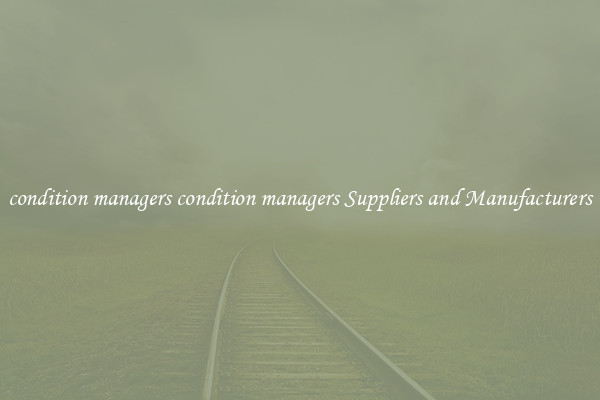condition managers condition managers Suppliers and Manufacturers
Condition managers play a crucial role in ensuring the quality and performance of products for suppliers and manufacturers. They are responsible for monitoring and analyzing the conditions under which products are manufactured, stored, and shipped to ensure they meet the required specifications and standards. By implementing effective condition management practices, suppliers and manufacturers can minimize the risk of product defects and recalls, improve customer satisfaction, and maintain a competitive edge in the market.

One of the key roles of condition managers is to oversee the environmental conditions in which products are produced. This includes monitoring factors such as temperature, humidity, air quality, and lighting to ensure they are within the specified ranges for optimal product quality. By implementing temperature and humidity control measures, for example, condition managers can prevent issues such as mold growth, spoilage, or degradation of product quality.
In addition to monitoring environmental conditions, condition managers also play a critical role in overseeing the transportation and storage of products. They work closely with logistics teams to ensure that products are handled and shipped in accordance with industry standards and best practices. By implementing proper handling and storage procedures, condition managers can prevent damage, contamination, or deterioration of products during transit.
Furthermore, condition managers collaborate with suppliers and manufacturers to develop quality control processes and protocols. They conduct regular inspections and audits to identify any potential risks or non-conformities in the production process. By implementing quality control measures, condition managers can detect and rectify issues early on, preventing costly recalls or customer complaints.
Overall, condition managers play a vital role in ensuring the quality and performance of products for suppliers and manufacturers. By monitoring environmental conditions, overseeing transportation and storage practices, and implementing quality control measures, they can help companies maintain high product standards, reduce risks, and improve overall customer satisfaction. Investing in effective condition management practices is essential for suppliers and manufacturers to remain competitive in today's fast-paced and demanding market.

View details

View details

View details

View details








